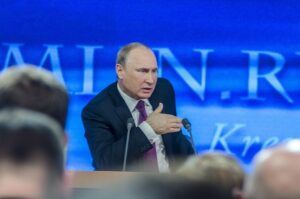A little directory of translation errors
History is strewn with translation errors resulting in consequences, some more serious, and some more amusing than others.
Here’s a small selection:
- 2017 -Miss Universe: Wrongly Translated Answers Could Have Cost Iris Mittenaere the Competition
- 2016 – Computer Programmed Translation and Trudeau speaking Gibberish
- 2014 – When translation gives rise to confusion
- 2014 – Nelson Monfort puts words in Usain Bolt’s mouth
- 2014 – A beauty tip turns disastrous due to a translation error
- 2014 – Putin on TF1: the French interview that sparked outrage…
- 2013 – Polemic concerning the fake translation during Mandela’s farewell ceremony
- 2013 – When a translation error leads to a Neanderthal clone
- 2013 – When translation and religion don’t go
- 2013 – The Estrela report on abortion dismissed for a translation error
- 2010 – A translation error that made the Euro plummet
- 2008 – Translation prolonging the war in Georgia
- 1977 – Jimmy Carter’s desire for Poland: An unfortunate translation
- 1956 – A narrow escape from WW3
- 1945 – An error that landed an atomic bomb
Miss Universe: Wrongly Translated Answers Could Have Cost Iris Mittenaere the Competition
Although his blunder seems insignificant compared to that of last year’s presenter who announced the wrong pageant winner, if Iris Mittenaere had not won Miss Universe on Monday in Manila (Philippines), her translator would have much to answer to. In the final round of questions, the candidate had to talk about a past failure and explain how she has learned from it.
She replied to the question in French “I thought I had failed my first year of medical school because at first I wasn’t on the passing list.” This was then translated as “I thought I had not qualified for casting the first time round.”
Likewise, the “medical textbook” became a “modelling book.” She went on to explain “That very same day, I went out and bought a new medical textbook”. The translator, instead of correcting his mistake, continued to skew her words: “The very next day, I found that I was in a new book.”
And when Iris Mittenaere concluded that she did “end up passing [her] first year of medical school,” the interpreter really hammered it home, still completely missing the point: “For me [this is] my first great opportunity.”
Computer programmed translation and Justin Trudeau speaking Gibberish
Justin Trudeau’s 2016 white house speech is a prime example of how modern translation can go very wrong, even for modern politicians. He delivered this speech in both English and French. However, Americans who watched the translated speech from Canadian French to English on ABC TV, heard him praise ‘Nazi sleeves’, Motorola stations’ and listened to him talking about ‘us old Guys and Houston days eight days it’s going’. Another full sentence that was created was: ‘keep on doing these and the union the years and that dictated sitcom’. As you might expect, this left a lot of listeners rather confused.
As Trudeau didn’t in fact say any of these things in real life, attention was brought to the method of translation used for the speech. According to ABC TV, a computer program was responsible for these mistakes, as it automatically translated Trudeau’s words from French to English. The program did not understand the context of his speech, and therefore created errors in the real meaning and led him to speaking nonsense at the White House.
If a human was behind this interpreting, and ABC hadn’t placed their trust in technology, it would have not been at all likely that these mistakes would have been made as even the most advanced language software can be unreliable.
When translation gives rise to confusion
It was definitely a first that an incorrect translation had created such a stir. Especially since it came from journalists!
With the Nobel Prize for Economic Sciences awarded to Jean Tirole, it was up to journalists to translate the title of the work in which the Royal Swedish Academy of Sciences presented the award.
Only, although the Academy had awarded Tirole for his “analysis of market power”, a large section of the press, such as Les Echos, L’Express, France Inter, Libération, Le Monde and even France 3 referred to this as having been rewarded for his analysis of power or of the strength of the market. This was completely incorrect because, here, the subject was “market power”.
Research shows that market power is defined by a situation of monopoly in which, when operating on a market without any competition, a company is able to impose its prices on end consumers, thus generating an added interest. This definition has no connection whatsoever with the strength or the power of the market (which refers to the market in general: monetary, financial, labour, real estate, etc.).
This is an incident that says a great deal about journalists’ English skills, especially when search engines such as Google were able to translate it correctly.
Nelson Monfort puts words in Usain Bolt’s mouth
On Thursday 14 August 2014, the second day of the 22nd European Athletics Championships in Zurich was broadcasted on France 2. When translating the live interview Usain Bolt gave for the news, Nelson Monfort put totally different words into his mouth.
 While the triumph of Eloyse Lesueur was meant to be the top story on France 2 on Thursday, the audience’s attention was taken up by something quite different. The six-time Olympic sprint champion Usain Bolt spoke for a few minutes to reporters before entering the Letzigrund Stadium. In the interview, he announced his new collaboration with Puma, the sportswear brand.
While the triumph of Eloyse Lesueur was meant to be the top story on France 2 on Thursday, the audience’s attention was taken up by something quite different. The six-time Olympic sprint champion Usain Bolt spoke for a few minutes to reporters before entering the Letzigrund Stadium. In the interview, he announced his new collaboration with Puma, the sportswear brand.
But when one of the journalists asked Usain Bolt about his sponsor, making reference to his next birthday, the sprinter replied that he was not very pleased to be ageing, despite only being 28. With regard to Puma, he spoke of a very longstanding collaboration in which Puma was not just a sponsor, but a kind of family. Nelson Monfort had to translate this short conversation into French for France 2, on the spot. He gave an incorrect translation and distorted Usain Bolt’s words, leading to total disinformation. He had Usain Bolt saying that he was getting old and thinking about starting a family soon…
A beauty tip turns disastrous due to a translation error
A publishing house in Prague offered its translation services to a German author, whose book is entitled ‘Gifts from Nature.’ But the difficulty of transcribing the author’s thoughts as-is led the translator astray.
In its translation, the publisher ended up suggesting a rather dangerous recipe for beauty to its readers: a soda bath.
Inadvertently, by mistake, or simply out of ignorance, the translator transformed the sodium bicarbonate in the book – referred to as

‘Natron’, into sodium hydroxide. But this chemical solution has a pH of 14 and is therefore better suited to unclogging drain pipes than it is to heal or beautify a person’s skin. What’s more, a small amount of this solution can blind a person if applied to the eyes!
Several months after the book hit the shelves, the publisher was warned of this imminent danger by a reader with a background in chemistry. Realizing the mistake and its potential impact on the general public, the publisher decided to pull the book from the market. But it also emphasized that few readers would have been able to discover this error. However, it’s enough to call into question the proofreading system some publishers use, given the enormous cost a quality work requires.
Putin on TF1: the French interview that sparked outrage…
A recent interview with Vladimir Putin was subject to different interpretations by women. Indeed, it seems that he let loose with his line: ‘It’s better not to debate with women.’ Is this Machismo or a translation error? It didn’t take long for the public to react…
 Certainly, the Russian President has built his reputation on having imprisoned countless opponents, having been the initiator of the separatist conflict in eastern Ukraine and still being the head of an army responsible for the death of thousands of Chechens. But it turns out that the comments about him these days are not related to these things… In fact, the reactions he aroused concerned the “contempt” towards women that was suggested through his remarks.
Certainly, the Russian President has built his reputation on having imprisoned countless opponents, having been the initiator of the separatist conflict in eastern Ukraine and still being the head of an army responsible for the death of thousands of Chechens. But it turns out that the comments about him these days are not related to these things… In fact, the reactions he aroused concerned the “contempt” towards women that was suggested through his remarks.
The former First Lady of the United States, Hillary Clinton, recently compared Putin to Hitler. Putin, however, was asked what he would’ve said to her if she’d said it to his face. That’s when he supposedly said, “It’s better not to debate with women.” Did the translator for the TV station mistranslate the Russian President’s words into French or did Putin really show contempt for women? The opinions differ.
Indeed, against the indifference the Russian President had shown towards his own wife last year, one could interpret his remarks on TF1 as further confirmation of his macho character. But on reflection, one could also hypothesize that the translation of his statements was misleading because they could also mean ‘it is pointless to argue with women.’
Polemic concerning the fake translation during Mandela’s farewell ceremony
Many people were shocked by the intervention of the interpreter, Thamsanqa Jantjie, when he translated into sign language the various speeches by the dignitaries who had come to say their farewells to Nelson Mandela.
Indeed, the translator was accused of having done an appalling job during the ceremony.
Firstly, it was the country’s deaf-mute community who spoke out, later supported by the association Deaf SA, who pointed out that it was not the first time that the incriminated translator had been found guilty of such failures during official ceremonies in South Africa. Furthermore, reports on this matter have gone unheeded by the competent authorities.
For the governmental authorities, it was the deputy Minister for the Disabled, Hendrietta Bogopane-Zulu, who responded by explaining this poor performance on an error resulting from the interpreter’s relatively poor standard of English.
Thamsanqa Jantjie himself blames his failure on a schizophrenic episode brought on by the stress provoked by the scale of the ceremony, something which has enraged the South African psychiatric community, which has accused him of wishing to hide behind a mental illness in order to hide his own incompetence.
In view of the scale of the polemic, the South African government officially presented its excuses to the country’s deaf-mute community via its Minister of Culture, Paul Mashatile. The outcome of the scandal is a plan to promulgate a law that regulates the profession of interpreting at the start of 2014.
When a translation error leads to a Neanderthal clone
Within the scientific community, George Churches name has incited quite a stir as he has been named as the man to take on the bizarre mission of cloning the genome of the Neanderthal man, our ancestor, who’s been extinct over 30,000 years ago.
Within a few hours, some of the most well-known websites retold the story, confirming that the Harvard University Professor and Geneticist wanted to clone the DNA of the Neanderthal man, who’s been extinct for over 30,000 years. The Independent was the first paper to print the story, the headline being unlike any other. It was stated that a Harvard professor was looking for an adventurous woman to birth a baby Neanderthal. Naturally this created quite a buzz.
Misinformation due to a bad translation
 Reactions to the news’ came very quickly; some people called the Harvard geneticist a mad scientist. Shortly afterwards, the story was denied. Apparently, there was a translation error between the interview published in German by the German weekly paper Der Spiegel and its interpretation by the British newspaper The Independent.
Reactions to the news’ came very quickly; some people called the Harvard geneticist a mad scientist. Shortly afterwards, the story was denied. Apparently, there was a translation error between the interview published in German by the German weekly paper Der Spiegel and its interpretation by the British newspaper The Independent.
In his interview, George Church only said that thanks to advances in the field of genetics, it was theoretically possible to clone DNA from Neanderthal man. One of the greatest genetic researchers denied his intention to seek a female carrier saying that his original words stated that a Neanderthal woman was required to deliver the Neanderthal fetus. The theory by Professor Church was therefore misinterpreted as a way of recruiting a willing female. It is safe to say that journalists, as well as translators have a role to play in ensuring that the correct information is allowed to be printed.
When translation and religion don’t go
To the delight of some journalists, an error appeared in the German translation of a book about Pope Benoît XVI, which brought about another debate regarding the Pope and his position on certain matters.
The book, called “Light of the world” contains an error within the translation of the text. The book states that the Pope and the church could accept the use of condoms, especially in cases such as prostitution, in order to reduce the spreading of AIDS. The Italian version talks about a female prostitute, whereas the German version has changed this to a male prostitute. Whether the translation be in German, Italian, or even English, the Popes ideas on this matter have progressed in recent years.
The correction came very late for this professional translation.
Whatever happens, the Vatican confirms that this professional translation error will be corrected in future editions of the book. According to a source: “It is not a realistic or moral solution, but in certain cases, and in order to reduce the transmission of the infection (AIDS), this is maybe the first step towards a more human approach towards sexuality”. According to the Vatican journalist Luigi Accattoli, who confronted the press, “Everything is indicating that the Pope wants a change regarding this issue, the married couple with one being infected, a person who cannot or will not avoid multiple relationships, a prostitute who could infect her clients.” were given as examples.
The Estrela report on abortion dismissed for a translation error
On Friday 13 December 2013, the Estrela report was rejected by the European parliament in favour of an alternative proposal as a result of a number of incorrect translations.
The report, submitted by the Socialist Member of Parliament of the same name, also Vice-Chair of the Committee on Women’s Rights and Gender Equality, proposed to make abortion a matter of European law. A coalition of right-wing and non-attached members submitted an alternative proposal which recommended that questions concerning abortion should be regulated on a national level.
Before the vote on the motion, the Portuguese MEP called upon her colleagues to reject this motion in favour of her own report. And, this is where the problem arose. The translations in French and German misled a certain number of MEP’s, including the Bulgarians, by misinterpreting Estrela’s words. The result was incontrovertible: 334 votes in favour and 327 against.
Despite calls for a new vote on the report, including that by the Green MEP Sandrine Bélier, who requested its referral to the Conference of Delegation Chairs, the President of the Parliament refused to question the result’s validity. Furthermore, it was revealed in the minutes of the session that eight MEPs changed their vote in favour of the report, but this had no effect on the final result.
A translation error that made the Euro plummet
It was in June 2010 when the euro plummeted below 1.20 dollars because of a translation error. It was one of the euros most drastic fall since its establishment.
On Friday the 4th of June 2010, Francois Fillon, the former French Prime Minister, visited Canada. He held a press conference after an official  government meeting, reporting on his visit. The days before his visit to Canada, the euro was depreciating on the foreign exchange market. Fillon was asked what his thoughts were on this and he replies with: ‘it’s only good news in the parity between the euro and the dollar.’ Fillon’s term ‘parity’ here refers to the ‘exchange rate of one currency in relation to another’.
government meeting, reporting on his visit. The days before his visit to Canada, the euro was depreciating on the foreign exchange market. Fillon was asked what his thoughts were on this and he replies with: ‘it’s only good news in the parity between the euro and the dollar.’ Fillon’s term ‘parity’ here refers to the ‘exchange rate of one currency in relation to another’.
However, in the English language, the term ‘parity’ is the state of something being equal, especially in regards to pay. It implies the perfect equality between two different currencies.
Here, the English-speaking audience now believes that Francois Fillon wants to install a common, transatlantic currency, to form perfect equality between the euro and the dollar; Fillon was not trying to get that across. After this, an official press release was published to verify Fillon’s meaning with the word parity. This example very much highlights the importance of an unwavering translation.
Translation prolonging the war in Georgia
 In 2008, the war between Russia and Georgia was raging. The conflict was seen as a major threat because of the Russian troop’s involvement. At the time, the French President was Nicolas Sarkozy, and he had a substantial involvement in this war. He adopted the role of mediator in order to get Russia to withdraw their forces. France prepared an agreement to Russia, the United States and Georgia to ceasefire.
In 2008, the war between Russia and Georgia was raging. The conflict was seen as a major threat because of the Russian troop’s involvement. At the time, the French President was Nicolas Sarkozy, and he had a substantial involvement in this war. He adopted the role of mediator in order to get Russia to withdraw their forces. France prepared an agreement to Russia, the United States and Georgia to ceasefire.
The issue in translation arose when documents were given from France to Russia and Georgia. The phrase ‘for Ossetia’ (where the conflict was centered) was written in the French and English documents, whereas in Russian, it was written as ‘In Ossetia’. This small lexical difference had much bigger consequences, as the Kremlin (the Russian government), interpreted this as an authorisation to place their tanks in the secessionist area of Georgia, when that was far from France’s intention. In fact, the Kremlin were required to withdraw all of their military assets from Georgia.
This resulted in Russia continuing the conflict for another month, in which diplomats attempted to reach a peace agreement. Thus, the Russians were accused of ignoring the ceasefire, due to one miniscule error in language.
Jimmy Carters’ desire for Poland: A very unfortunate translation
A particularly famous example is that of the former president of the United states of America, Jimmy Carter, which acts as yet another example that politicians are not new to translation errors. It was when Jimmy Carter travelled to Poland in 1977 for a press conference, in order to give a sympathetic speech to the citizens of Poland, because they was still under communist rule. Carter was very happy to be in Poland because he had a sexual desire for the country…
As you might have guessed, these are not the words that came out of President Carter’s mouth. The state department had hired a Russian born interpreter to translate Carter’s speech, though he had quite limited skills in translating Polish because he had never done it on such a professional level like this. The polish language was abused here, as what he meant to say was ‘I am happy to be here in Poland’, yet what the audience heard was ‘I am happy to see the private parts of Poland’. After this, the interpreter was immediately replaced, as the delegation was very embarrassed. The Polish audience also heard the translation of Jimmy Carter saying, ‘This morning I left the United States forever’, when carter merely exclaimed that he had left the United States, but not forever.
A narrow escape from WW3
The Soviet Prime Minister Nikita Khrouchtchev experienced a translation error in 1956, in the middle of the Cold War, which nearly resulted in very grave consequences. Khrouchtchev was interpreted in Moscow, at the Polish embassy, and was perceived to have said ‘Whether you like it or  not, history is on our side. We will bury you.’ to a group of western ambassadors.
not, history is on our side. We will bury you.’ to a group of western ambassadors.
This caused a lot of unease, not only at this particular event, but also in the western press straight after, who perceived this as a potential threat. Luckily, the mistake was quickly corrected. Looking at the context, the statement was likely to have been referring to the capitalist system, rather than an actual country. Some translators argue that the phrase he used more so translates to ‘We will be present when you are buried’, which essentially means ‘We will survive you’.
Over the years after this event, Khrouchtchev had to give many explanations for this misunderstanding. It came up again at the National press conference in Washington in 1959, in which the Prime Minister said, “the words ‘We will bury Capitalism’ should not be taken literally, like ordinary gravediggers who carry shovels, dig graves and bury the dead. What I had in mind was the development perspective of human society. Socialism will inevitably surpass capitalism.”
Here we can see that Khrouchtchev’s interpretation, although problematic, was in fact a misunderstanding of his ideological intention rather than a word for word translation mistake. His words were perceived as literal, and therefore provocative instead of metaphorical.
An translation error that landed an atomic bomb
This translation error is one of the most well known in history, and one of the most tragic. It was in 1945 when the Allied powers of World War 2  issued the ‘PostDam declaration’, which was an ultimatum from the US, UK and China for the surrender of Japan, an ally of the Nazi regime. The ultimatum wanted Japan to surrender, and if they refused, Japan would risk ‘immenent and total destruction’.
issued the ‘PostDam declaration’, which was an ultimatum from the US, UK and China for the surrender of Japan, an ally of the Nazi regime. The ultimatum wanted Japan to surrender, and if they refused, Japan would risk ‘immenent and total destruction’.
When the Japanese Prime Minister, Kantaro Suzuki, responded to this ultimatum at a press conference, he chose the quite ambiguous Japanese term of ‘Mokusatsu’; the allies did not interpret this correctly. This word can be understood in two different ways, one could translate to ‘We will think about it’ and the other meaning translates to ‘I treat this with contempt.’ Suzuki intention was to let them know that they didn’t want to comment on the ultimatum at that moment, but it came across as if he wanted to ignore it entirely; the Americans took it as a refusal.
Convinced that the Japanese wouldn’t surrender, the US dropped two atomic bombs on Hiroshima and Nagasaki, in order to force Japan to bow. From here, the rest is known, and it wasn’t until ten days after the Japanese Prime Minister stated these words that the bombings happened. Months after the tragedy, the Japanese Government then exclaimed that they intended on surrendering, but merely wanted to buy time at the same time as not rejecting their ultimatum.
Written By Esther Jamieson








